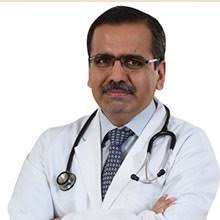Are you searching for Best Liver Cirrhosis Treatment Doctors in India
Best Liver Cirrhosis Treatment Doctors in India
Liver cirrhosis is a long-term condition in which healthy liver tissue is gradually replaced by scar tissue, reducing the liver’s ability to function properly. It is often caused by chronic hepatitis, excessive alcohol intake, or fatty liver disease, and may lead to complications such as internal bleeding, fluid retention, and eventual liver failure.
India has become a preferred destination for liver cirrhosis care, providing advanced treatments, liver transplantation, and internationally recognized medical facilities at affordable prices.
We feature a carefully selected list of Best Liver Cirrhosis Treatment Doctors in India known for their expertise, compassionate care, and successful treatment outcomes.
Dr. Sumeet Shah

MBBS, MD, DM, Fellowship
25 Years Years of Experience
Gastroenterologist, Hepatologist
Pushpawati Singhania Research Institute (PSRI), Hospital, New Delhi
Dr. Yogesh Batra

MBBS, MD, DM, Fellowship
18 Years Years of Experience
Gastroenterologist, Hepatologist
Dr. Sanjiv Saigal

MBBS, MD, DM, DNB, MRCP, CCST, MAMS
36 Years of Experience
Hepatologist, HPB and Liver Transplant Surgeon
Contact Us
Dr. Anupam Sibal

MBBS, MD, FRCPCH, FRCP, FAAP, FIMSA, FIAP
34 Years Years of Experience
Hepatologist, Pediatric Gastroenterologist
Dr. Abhideep Chaudhary

MBBS, MS, FACS, FAIS, FRCS
19 Years of Experience
HPB and Liver Transplant Surgeon
Contact Us
What is Liver Cirrhosis?
Liver cirrhosis is a late-stage liver disease characterized by irreversible scarring of the liver. As scar tissue replaces healthy cells, the organ struggles to function effectively. The damage caused by cirrhosis is permanent, but early diagnosis and proper treatment can slow its progression and prevent complications.
Causes of Liver Cirrhosis
Several factors can contribute to the development of cirrhosis. The most common include:
- Chronic Hepatitis B and Hepatitis C infections – Long-term viral infections that damage liver tissue.
- Excessive alcohol consumption – A leading cause worldwide, where prolonged alcohol abuse leads to liver inflammation and scarring.
- Non-alcoholic fatty liver disease (NAFLD) – Linked to obesity, diabetes, and metabolic syndrome, where fat buildup in the liver causes inflammation.
- Autoimmune hepatitis – A condition where the immune system mistakenly attacks liver cells.
- Genetic conditions – Disorders like Wilson’s disease and hemochromatosis can cause cirrhosis.
- Prolonged exposure to toxins or medications – Certain drugs or harmful chemicals can damage the liver
Symptoms of Liver Cirrhosis
In its early stages, liver cirrhosis may not cause noticeable symptoms. As the disease progresses, patients may experience:
- Persistent fatigue and weakness
- Loss of appetite and unintended weight loss
- Yellowing of skin and eyes (jaundice)
- Abdominal swelling due to fluid buildup (ascites)
- Easy bruising and bleeding
- Itchy skin and spider-like blood vessels on the skin
- Confusion or memory issues (hepatic encephalopathy)
- Swelling in the legs and ankles
- Vomiting blood or black stools due to internal bleeding
Recognizing these symptoms early and seeking medical attention is crucial for effective management.
Diagnosis of Liver Cirrhosis
To confirm liver cirrhosis, doctors use a combination of medical history, physical examination, and diagnostic tests. Common methods include:
- Blood tests – To check liver function, clotting ability, and viral infections.
- Imaging tests – Ultrasound, CT scan, or MRI to detect scarring, nodules, or enlarged veins.
- Fibroscan – A specialized scan to assess the degree of liver stiffness.
- Endoscopy – To check for varices (swollen veins) in the esophagus or stomach.
- Liver biopsy – A small tissue sample examined under a microscope for confirmation.
Treatment Options for Liver Cirrhosis
While the scarring of the liver cannot be reversed, treatment focuses on slowing progression, preventing complications, and improving quality of life.
Lifestyle Modifications
- Complete abstinence from alcohol
- Maintaining a healthy weight and diet
- Regular monitoring of liver function
Medications
- Antiviral drugs for hepatitis infections
- Drugs to reduce portal hypertension and prevent bleeding
- Diuretics to manage fluid retention
- Lactulose to reduce toxins and treat encephalopathy
Endoscopic and Interventional Procedures
- Endoscopic banding or sclerotherapy to control variceal bleeding
- Transjugular intrahepatic portosystemic shunt (TIPS) to reduce portal hypertension
Liver Transplantation
For advanced cirrhosis or end-stage liver disease, liver transplantation becomes the only curative option. India has emerged as a leading center for liver transplants, with highly experienced surgeons performing thousands of successful procedures every year.
Why Choose India for Liver Cirrhosis Treatment?
India has become a preferred destination for international and domestic patients seeking affordable and advanced liver care. Key reasons include:
- World-class hospitals equipped with modern infrastructure, ICUs, and transplant units.
- Highly skilled specialists trained internationally in hepatology and liver transplantation.
- Affordable treatment costs compared to Western countries.
- High success rates in liver transplants, often comparable with the best centers worldwide.
- Availability of advanced technology like robotic surgery, minimally invasive techniques, and personalized treatment plans.
Cost of Liver Cirrhosis Treatment in India
Treatment costs in India vary depending on the severity of the condition and type of treatment:
- Diagnostic tests: USD 500 – 1,000
- Medications and outpatient care: USD 1,500 – 2,500
- Endoscopic procedures: USD 2,500 – 4,000
- TIPS procedure: USD 4,000 – 6,000
- Liver transplantation: USD 23,000 – 30,000 (including surgery, hospital stay, and follow-up)
These costs are significantly lower compared to countries like the US, UK, or Singapore, making India a highly cost-effective destination.











